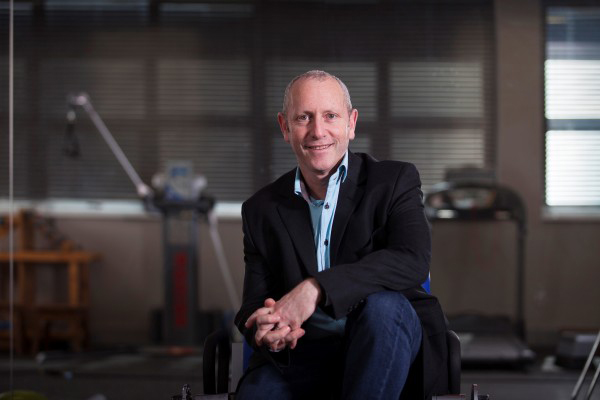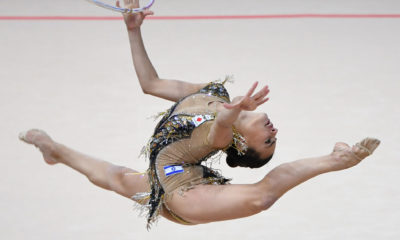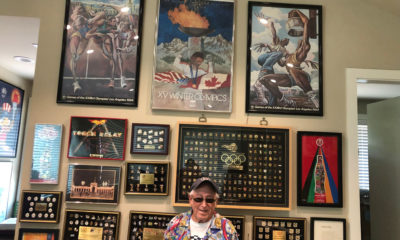
Lifestyle

Bringing SA expertise to the Paralympics
Published
3 years agoon
Sports and exercise-medicine expert Professor Wayne Derman has worked with elite athletes for his whole career, so when he was appointed chief medical officer to the Paralympics Games in Beijing in 2008, he felt like it was a step backwards. That is, until he met the athletes themselves.
“I realised [that] it was the ultimate challenge in sports medicine,” he says. “You’re working with athletes at the highest level, and then they have this added layer of disability and each one is different. It was the most magnificent transformation in my own learning, compassion, and awakening.”
So, when it came to the Paralympics in London and Rio de Janeiro, he was first in line to take on the same role. Now, he is about to step onto a plane to the Tokyo Paralympics – and it may just be his biggest challenge yet.
“I’m excited. I haven’t travelled in a year and a half, and I used to take an overseas trip a month [before the pandemic],” he says. He is part of the medical team of the International Paralympics Committee, which consults doctors whose athletes have complicated or difficult issues.
He’s also going as a doctor to a number of South African Paralympic athletes, but he’s not the official team doctor. On top of all that, he will be conducting an injury and illness surveillance study for the entire Paralympics, together with Stellenbosch University.
“The study was initiated by the desire to make sports safer,” he says. “You can’t measure illness and injury if you don’t know which sports are higher risk.”
They found that the most dangerous sport for a disabled athlete is blind soccer, also known as 5-a-side soccer or football 5-a-side. It’s an adaptation of soccer for athletes with a visual impairment, and is played with modified FIFA (International Federation of Association Football) rules.
To ensure fair competition, all players wear eyeshades. Each team has a goalkeeper who is sighted. The ball makes a noise due to a sound system located inside that helps players orientate themselves. Teams have off-field guides to assist them. “The game can lead to head injuries or concussion, so we’ve taken steps to heighten awareness and made changes to make it safer,” says Derman.
The study is specifically for the Paralympics, but there is a similar initiative at the Olympics. “This year, there is the added ‘layer’ of COVID-19,” he says. “For some time, we’ve been trying to implement an illness-prevention programme. The most common illnesses contracted by athletes are respiratory tract illnesses, which can take them out of the games. So, we were trying to implement a programme of sanitising, early isolation, and so on, but were battling to get it instituted. With the pandemic, it’s been done for us!”
When he’s not at the Paralympics, Derman has a full schedule as director and chair of The Institute of Sport and Exercise Medicine (ISEM) at Stellenbosch University’s Tygerberg Campus. He’s also the director of the FIFA Medical Centre of Excellence, and co-director of the South African International Olympic Committee Research Centre for Injury Prevention and Protection of Health of the Athlete.
In these roles, he does a large amount of research and academic writing. He also works in under-resourced communities, such as in the ISEM’s rehabilitation centre in Bishop Lavis on the Cape Flats. And, Derman works to ensure safety in sport, with a particular focus on rugby at university level. He trains doctors in sports and exercise medicine, and is currently supervising 14 doctors from around the country doing their MSc (Masters) in sports medicine, which he sees as “a great honour and privilege”. He also spends two days a week seeing patients in private practice.
Finally, he manages to fit in his own exercise routine, especially running. And as the father of four, his children keep him on his toes – especially his youngest, who is following in his dad’s footsteps with a true passion for sport.
Amidst it all, he found time recently to help develop a free online tool to assist event organisers to assess and mitigate COVID-19 risk during endurance-sports events. “You enter the country and area you are in, the number of people you expect, and mitigating factors like limiting numbers, having sanitiser available, and staggering the start. The tool will then calculate how safe your event is in terms of COVID-19. It will make suggestions about how to lower your risk score and raise your mitigation score.”
Derman says the tool, available on the World Athletics website, is already being used, and will allow event organisers to bring back sport in circumstances in which it’s safe to do so.
Reflecting on the Olympics, he says “COVID-19 represents a huge challenge”, and the event highlights “a lot of hard and considered work by a lot of people, who came together to make it the safest games possible in the current circumstances”.
“Statistics show it’s working well,” Derman says. “We’re only halfway through, but the positivity rate for COVID-19 at the Olympic Games amongst athletes and staff is only 0.02%. Meanwhile, the numbers in Tokyo itself are just rising. But it’s not the Olympics that’s causing that rising rate. The games are totally sealed off. The workforce is tested every day, and this ongoing monitoring is really working.”
He says it’s a highlight to work with Paralympic athletes because “there are no prima donnas”. On the para-athletes to watch in these upcoming games, he recommends keeping an eye on sprinter Charl du Toit, who has cerebral palsy, and Anrune Liebenberg, who has an arm amputation. Both will be running the 400m and 200m, and are “gold medal contenders.” Then, he recommends watching Ntando Mahlangu, a double amputee track star who he predicts will “set the stage alight”.
He believes the pandemic “will change the face of sport – and life as we know it. For athletes, travel is already a high-risk period of when they could get ill, and the pandemic has highlighted that. So precautions like wearing a mask when travelling are here to stay – especially for athletes.”
He is on the planning committee for the winter Paralympics and the winter Olympics to be held in Beijing in March 2022. “We are taking the same counter measures like testing and tracking – it’s just as radical. So this isn’t going away soon. I think flexibility and resilience in the face of sudden change are the main teachings of the pandemic.”
For young people thinking of going into sports medicine, Derman says, “It’s a great career choice. When I did sports medicine I had to forge my own path, now it’s a recognised specialty. It’s not only about elite athletes, it’s about mitigating chronic diseases. Exercise is the strongest preventative strategy in preventing heart and lung disease, cancer, and diabetes. So, sports medicine will continue to play an important role in society.”
With his qualification and experience, Derman could go anywhere in the world – but for now, he’s staying put. “In spite of the fact that South Africa has been through a rough time, I remain very optimistic. I’m here for the long run.”
Finally, he says, “The Olympics are special, but the Paralympics are extra special. They give the gift of perspective and gratitude. I hope you’ll be watching!”










